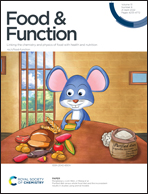Rosmarinic acid ameliorates renal interstitial fibrosis by inhibiting the phosphorylated-AKT mediated epithelial–mesenchymal transition in vitro and in vivo
Abstract
Indoxyl sulfate (IS), a uremic toxin, causes chronic kidney disease (CKD) progression via renal fibrosis. Epithelial–mesenchymal transition (EMT) is a crucial feature of renal fibrosis. Rosmarinic acid (RA) is an ester of caffeic acid and 3,4-dihydroxyphenylacetic acid with a wide range of desirable biological activities. In this study, we investigated whether RA exerted anti-renal fibrosis effects and its related mechanisms in a unilateral ureteral obstruction (UUO) mouse model. C57BL/6 mice were orally administered RA (10 and 20 mg kg−1 d−1) for 7 consecutive days before and after UUO surgery. The mice were then sacrificed to collect the blood and kidneys. Hematoxylin and eosin (H&E) and Masson's trichrome staining were used to evaluate the renal injury and function. Immunohistochemical analysis, reverse transcription-polymerase chain reaction (RT-PCR), and western blotting were used to detect the expression levels of EMT markers. In vitro studies were performed using the IS-stimulated NRK-52E cell line. Here, the pathological changes, collagen deposition, and mRNA and protein expression levels of profibrotic factors and fibrotic markers were found to be significantly elevated in the kidneys of UUO mice. We found that RA administration significantly ameliorated UUO-induced kidney damage by reversing abnormal serum creatinine and blood urea nitrogen levels. It was found that RA treatment decreased the expression levels of alpha-smooth muscle actin (α-SMA), collagen I, fibronectin, transforming growth factor (TGF)-β1, vimentin and phosphorylated AKT (p-AKT) while increasing the E-cadherin expression in both UUO kidneys and IS-treated NRK-52E cells. Our results demonstrate that RA may be a promising therapeutic agent for renal interstitial fibrosis.



 Please wait while we load your content...
Please wait while we load your content...